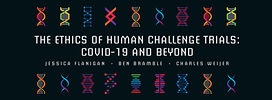Lead Essay
Jessica Flanigan says much of the suffering of the past year might have been avoided had vaccines been available earlier, and this could have been the case in a culture and regulatory environment that supported and welcomed human challenge trials. Flanigan argues that bureaucratic foot-dragging and excessive caution on these matters have been some of the most serious contributors to the severity of the pandemic, and that ethicists and researchers should bear this in mind for the future.
Response Essays
Ben Bramble argues that challenge trials would be less of a help against COVID-19 than we may suspect. He adds that the real lost opportunity for the United States in the last year was that the United States never acquired sufficient personal protective equipment and failed to implement contact tracing and a strict, nationwide lockdown. If such measures were in place, the pandemic might have been kept at bay, but the fact that they were not implemented does not warrant turning humans into guinea pigs.
Charles Weijer says that it’s impractical, unethical, and simply dangerous to expose healthy volunteers to the virus that causes COVID-19. Promises of faster vaccines and greater knowledge about the virus are illusory because the necessary safety measures and experimental protocols can’t even be considered, much less designed, in the absence of good data. This makes human challenge trials fundamentally unworkable.

